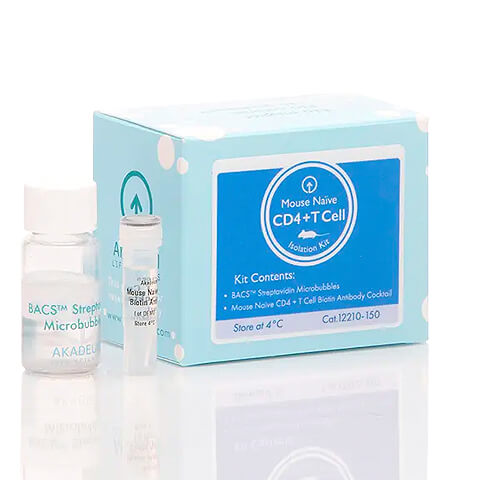Achieve Gentle Mouse Naïve Cell Isolation Using Akadeum’s Microbubble Naïve Mouse Kits
Updated on May 17, 2025 Share
In working with biological samples for life science research, sample preparation is a critical first step to isolate the specific cells of interest from a complex mixture. This is especially true when looking to isolate rare cells of low abundance, and it is critically important when working with delicate cell types that the sample preparation method used for cell isolation is exceptionally gentle so that it does not interfere with the health and physiology of target cells during the enrichment process. When looking to isolate naïve mouse cells, like naïve T cells or naïve CD4+ T cells, it is of the utmost importance that the cell isolation process results in a highly pure population of healthy, viable, and unaltered cells of interest for downstream use.
What are Naïve Cells?
Naïve cells are cells that haven’t fully differentiated into their specific roles. Naïve cells will develop either in the thymus or the bone marrow and continue to be naïve until they encounter an antigen-presenting cell (APC). Essentially, they are matured cells that haven’t been activated yet.
Naïve cells of all types are beneficial to the research community because they can be manipulated and activated into other cell types. True naïve cells can be stimulated with a variety of coreceptors, while other naïve cells can only be activated with specific antigens that target specific T cell receptors. By studying the way in which naïve cells evolve into fully functional, specialized immune cells, scientists can gain insight into the artificial development and activation of cells for practical applications.
What are Mouse Naïve Cells?
Mouse naïve cells function similarly to human naïve cells. Mouse naïve cells are inactivated cells circulating in a mouse’s bloodstream. These cells will eventually differentiate into a variety of cells with different functions and relocate to their specific regions. Mouse (murine) naïve cells of all kinds can be found in abundance in the spleen.
Mouse Naïve Cell Isolation
Mouse naïve cells are relatively fragile and therefore require a gentle isolation method. Blunt physical forces or harsh magnetic fields can decrease the overall throughput and viability of a sample. Traditional forms of cell separation can be harsh on delicate cells, or can result in too few cells for meaningful analysis.
Naïve Mouse Cell Products
Akadeum Life Sciences currently offers two products for mouse naïve cell isolation. Each of these microbubble-based cell isolation kits has specific biological markers it uses to identify unwanted cells and remove them from a sample, resulting in highly pure population of untouched, unaltered, and healthy naïve cells of interest.
Mouse Naïve T Cells
Mouse naïve T cells are newly developed cells that have already matured in the thymus but have yet to receive their specific roles. By the time a cell becomes a naïve T cell it has been partially activated by APCs. Akadeum’s Mouse Naïve T Cell Isolation Kit is designed for fast and gentle sample preparation, saving you time on cell sorting and downstream processing by enriching splenocyte samples for a highly pure population of naïve T cells of interest.
Our functionalized microbubbles combine the specificity of affinity molecules with the power of gravity for sample preparation so simple, it floats. Our microbubbles are mixed directly into the sample where they bind to the unwanted cells, floating them to the top for removal. The naïve T cells remain untouched, ready for processing and analysis.
Mouse Naïve CD4+ T Cells
Mouse naïve CD4+ T cells are further activated than mouse naïve T cells, but still not fully specialized. CD4+ T cells are also called “helper T cells” because they help signal and facilitate the behaviors of other T lymphocytes during an immune response. Naïve CD4+ T cells have yet to receive their exact function, and therefore can be stimulated by researchers to do certain things.
Akadeum has developed a Mouse Naïve CD4+ T Cell Isolation Kit that isolates a high-purity sample of mouse naïve CD4+ T cells for downstream applications. Using microbubbles for sample preparation preserves cell physiology while reducing sorting times, delivering a highly enriched population of these highly specific target cells for downstream use.

Using Microbubbles for Gentle Mouse Naïve Cell Isolation
Akadeum’s microbubble workflow is exceptionally gentle on even the most delicate of immune cells – including Naïve T Cells and Naïve CD4+ T Cells. Our revolutionary approach to sample preparation uses buoyant microbubbles to quickly enrich your sample while maintaining target cell health and physiology. Our microbubble workflow takes only 30 minutes to complete and requires no additional equipment (the enrichment can happen directly in your sample container). More importantly, it does not require the use of harsh chemicals, external magnetic forces, or the use of rare earth magnets. Our microbubbles harness the power of gravity (they float!) for separation, leaving your target cells happy and healthy, and ready for downstream processing.
At Akadeum Life Sciences, we are committed to improving science through better separation technology. We have a team of scientists who are available to answer any questions you may have—we’d love to hear more about your work and help you develop a workflow that takes advantage of our microbubble technology.



